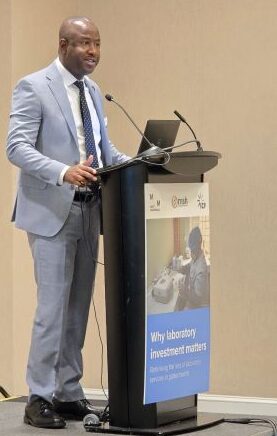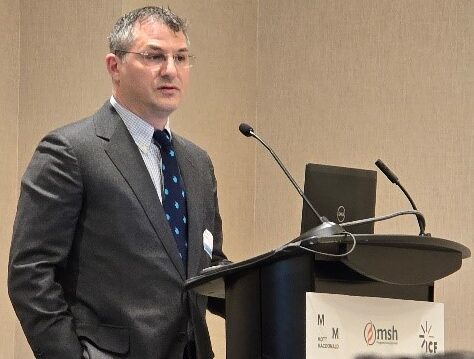Exploring the Patient-Centred Approach to Diagnostic Care
Access to high quality laboratory services is a cornerstone of a healthy, productive community. Quality of life and life expectancy are also improved by the knowledge and availability of laboratory testing in one’s community. In order to provide the basic human right of health, diagnostic services must be readily available and accessible to those who the community serves. The provision of high-quality laboratory services is a fundamental pillar of a thriving and healthy community. The accessibility and knowledge of laboratory testing contribute not only to the enhancement of quality of life but also to increased life expectancy. The availability of diagnostic services within a community is crucial in upholding the basic human right to health.

On 29 January, ASLM CEO, Mr Nqobile Ndlovu made a Keynote presentation to a delegation of global health experts in Washington, D.C. who were attending the Mott MacDonald meeting, Why Laboratory Investment Matters, co-organized by MSH and ICF. He spoke to the audience about the importance of taking a patient-centred approach to diagnostic testing. A patient-centric approach involves treating the patient with dignity, respect and allows them to be an integral part of the decision-making process about their health goals and treatment plan. This method of healthcare is designed to ensure that communication between the healthcare provider and patient is open and clearly understood. Mr Ndlovu encouraged the attendees to, “think about the patient at every step of the diagnostic value chain.”
During his presentation, Mr Ndlovu stressed the importance of ensuring that healthcare interventions meet the community’s needs and utilize the necessary tools. Access to diagnostic testing is crucial, but without demand creation, patients may remain unaware of their options. The clinic-laboratory interface plays a pivotal role, informing clinicians about available diagnostic technology so they can discuss viable options with patients. Laboratories should educate clinicians on multiplex capabilities to optimize the detection of multiple medical conditions in a single test, enhancing efficiency and reducing the need for patients to make multiple trips to distant clinics. Civil society also plays a vital role in creating demand and holding everyone accountable for patient education.
Mr Ndlovu advocated for increased collaboration between public and private clinics and labs to address capacity issues that arise. This cooperative effort ensures serving patients’ needs, aligning with the essence of a patient-centred approach to diagnostic testing. A strong partnership between the patients, clinics and laboratories is emphasized to yield optimal results and enhance the overall quality of patients’ lives.

The meeting featured additional presentations were from Dr Yenew Kebede Tebeje of Africa CDC, Dr George Alemnji of PEPFAR, and a host of global health leaders and experts from Mott MacDonald. Topics covered included rolling-out national diagnostics lists integrated diagnostics systems, embracing artificial intelligence. Dr Toby Leslie, Senior Health Advisor at Mott MacDonald and Global Technical Lead for the Fleming Fund, highlighted strategic funding approaches. Dr Leslie recommended that emphasis must be on the benefits of an investment rather than presenting mere cost breakdowns.
ASLM expressed its honour at being invited to contribute to the meeting acknowledging its fruitful partnership with Mott MacDonald and the Flemming Fund. The collaboration has supported various initiatives including EQuAFRICA, MAAP, QWArS and others. For more insights into the significance of laboratory investment, access the Mott MacDonald paper here.
